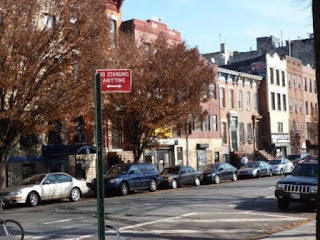In the last moment of my life, I saw the day before Thanksgiving...
I'd just pedaled a few strokes around the virage; a bed of wildflowers turned, in an instant, into a glacial field. The sun was so bright it turned into the kind of liquid haze through which dreams skip and float along with the words that make sense only in those dreams.
It was noon. We were all lined up--the boys on one side, the girls on the other--to leave school for the day, the next day, and the three days that would follow. For some reason, when I was a kid, that was always my favorite moment of the year. Even the seemingly-capricious discipline of the Carmelite nuns who taught in our school could not make that moment less happy. They could cast a pall over the day before Christmas Eve, over Holy Thursday. Whether or not they loaded us down with homework, they left us in such a mood that Christmas, even if we got the gifts we hoped for, seemed more like a truce, and Easter was just too holy of a day to really consider as a vacation, even if we were home for the week that followed.
But noon on the day before Thanksgiving always seemed like the most carefree moment of the year. In most years, it began the last interlude of Fall; the lights of Christmas only accented the darkness that consumed ever-larger parts of the days that would follow. In that moment, on the day before Thanksgiving, one could still see the last flickerings of the autumnal blaze that burned green leaves into the colors of the sunset. Somewhere along the way, they turned as yellow and, for a few days, as bright as the sunlight that filled the air around the mountain I was climbing on my bike.
It was just about noon; I would soon be at the peak of le Col du Galibier, one of the most famous climbs on the Tour de France. From there, I would have a long effortless ride to the valley. In the meantime, each pedal stroke would become more arduous. I'd been pedaling all morning, but even more important was the altitude: I was more than a mile and a half above sea level. The air is thinner, and even though my breath steamed as I puffed up that mountain on that July morning, the sun burned through the layers of sun screen I'd lathered on my arms and face.
Bells rang. Dismissal? Or the cows in the herd down the mountain? I stopped for a drink and one of the crepes I'd packed into my bag. I took a bite and a gulp.
You're free. I wasn't sure of whether I was hearing that. Perhaps I was giddy from the thin mountain air. Yes, you're free. But I wasn't hearing it: It was being told--or, more precisely, communicated--to that child who was being dismissed from school on the day before Thanksgiving. You can go now. What are they talking about? Who's "they"?
You don't have to do this again. I'd never heard that before, certainly not in those days. What did that mean? What won't I have to do again? Climb this mountain? Go to school?
Down the Col du Galibier, through the Val de Maurienne, as the eternal winter of that mountaintop turned into the hottest day of summer in the valley, my mind echoed. What, exactly, wouldn't I have to do again?
Near the end of that day, I reached St. Jean de Maurienne, just a few kilometers from Italy. There, I would see the stranger who, inadvertently, caused me to see that I could follow no other course but the one that my life has taken since then. A year later, I would move out of the apartment I'd been sharing with Tammy; about a year after that, I would change my name and begin my treatments.



